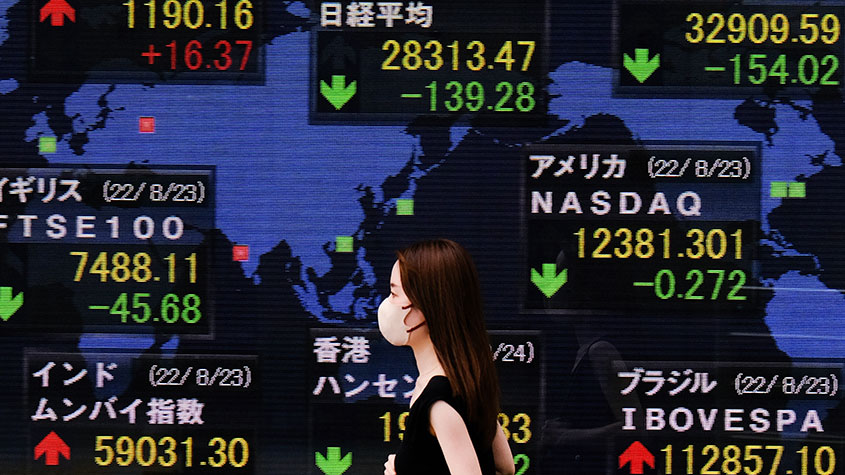When to use a currency-hedged ETF
Last week, iShares launched Europe's first currency-hedged exchange-traded funds. They are a valuable addition to investors' armoury - but when should you use them? Paul Amery explains.

Get the latest financial news, insights and expert analysis from our award-winning MoneyWeek team, to help you understand what really matters when it comes to your finances.
You are now subscribed
Your newsletter sign-up was successful
Want to add more newsletters?

Twice daily
MoneyWeek
Get the latest financial news, insights and expert analysis from our award-winning MoneyWeek team, to help you understand what really matters when it comes to your finances.

Four times a week
Look After My Bills
Sign up to our free money-saving newsletter, filled with the latest news and expert advice to help you find the best tips and deals for managing your bills. Start saving today!
Last week, iShares launched Europe's first currency-hedged exchange-traded funds (ETFs). These allow investors to remove the currency risk component from three popular global equity indices: the MSCI Japan (available in a euro-hedged version only), MSCI World, and the S&P 500 (these are offered in both sterling- and euro-hedged versions).
The advantage of currency hedging is that you can split the investment decision regarding the underlying market from your view on its currency. Want to buy US shares, but concerned about the dollar? Buy a hedged S&P 500 fund. Feel that Japan's stockmarket is bottoming, but worried that the yen is vastly overvalued? Consider the hedged MSCI Japan ETF.
But you can look at these things the other way round, too. I've been an investor in Lyxor's Japan Topix ETF since early 2008. In domestic currency terms the Topix is well down since then. But as a sterling-based investor I'm actually up on my purchase price, due to the pound's weakness over the same period. If I'd bought a currency-hedged Japanese fund, I'd have foregone all those FX gains.
MoneyWeek
Subscribe to MoneyWeek today and get your first six magazine issues absolutely FREE

Sign up to Money Morning
Don't miss the latest investment and personal finances news, market analysis, plus money-saving tips with our free twice-daily newsletter
Don't miss the latest investment and personal finances news, market analysis, plus money-saving tips with our free twice-daily newsletter
Currency hedging can also cost money if you're hedging from a high-interest rate currency to a lower-rate one (though you pick up a premium if it's the other way around). But with near-zero rates in most major FX blocs, this isn't a major concern right now. You also need to beware being sold the right product at the wrong time. In the US ETF market, for example, there was a clamour for funds offering currency-hedged exposure to foreign stocks earlier this year as the euro collapsed to $1.18. But you'd have missed out on a 17% rally in the euro since
May if you'd followed the majority view.
All of this means that even if you're buying a currency-hedged investment, it's not sufficient just to have a view on the underlying market: you need to consider the currency regardless. But these new funds are still a valuable addition to investors' ETF armoury. If you feel that global stockmarkets are due a bounce, but also that sterling is so beaten up that it, too, may recover, then a currency-hedged fund is an ideal choice.
Paul Amery edits www.indexuniverse.eu .
Get the latest financial news, insights and expert analysis from our award-winning MoneyWeek team, to help you understand what really matters when it comes to your finances.
Paul is a multi-award-winning journalist, currently an editor at New Money Review. He has contributed an array of money titles such as MoneyWeek, Financial Times, Financial News, The Times, Investment and Thomson Reuters. Paul is certified in investment management by CFA UK and he can speak more than five languages including English, French, Russian and Ukrainian. On MoneyWeek, Paul writes about funds such as ETFs and the stock market.
-
 Should you buy an active ETF?
Should you buy an active ETF?ETFs are often mischaracterised as passive products, but they can be a convenient way to add active management to your portfolio
-
 Power up your pension before 5 April – easy ways to save before the tax year end
Power up your pension before 5 April – easy ways to save before the tax year endWith the end of the tax year looming, pension savers currently have a window to review and maximise what’s going into their retirement funds – we look at how
-
 Profit from MSCI – the backbone of finance
Profit from MSCI – the backbone of financeAs an index provider, MSCI is a key part of the global financial system. Its shares look cheap
-
 Ashoka: A new, but reliable, trust you can count on
Ashoka: A new, but reliable, trust you can count onOur investment columnist, Max King, says tough times breed investment trusts like Ashoka, that you can trust.
-
 Should you stick with Mid Wynd investment trust?
Should you stick with Mid Wynd investment trust?Tips Max King looks at the prospects for Mid Wynd as the trust prepares to say goodbye to Simon Edelsten and Alex Illingworth, managers of the trust since 2014.
-
 What is an index fund?
What is an index fund?Glossary We outline everything you need to know about index funds, from what they are and how to buy them, to the things to consider before you do so.
-
 Low-cost index funds for simple investing
Low-cost index funds for simple investingTips Index funds are an easy, low-cost way for investors to invest in a sector or asset class. Here’s a selection of the cheapest passive tracker funds on the market right now
-
 Analysis: it’s been a terrible six months for investment trusts
Analysis: it’s been a terrible six months for investment trustsAnalysis The first half of the year has not been kind to investment trusts because of their skew towards growth stocks and the global downturn, says Max King. But they will recover.
-
 A core US fund that should be part of every portfolio
A core US fund that should be part of every portfolioAnalysis The UK market’s recovery might not be here to stay. America offers a compelling alternative, says Max King.
-
 Three healthcare trusts to invest in
Three healthcare trusts to invest inAnalysis The biotech sector is in its biggest bear market in 30 years. But Max King explains why this sector could turn around soon and three healthcare trusts that may be worth investing in.
